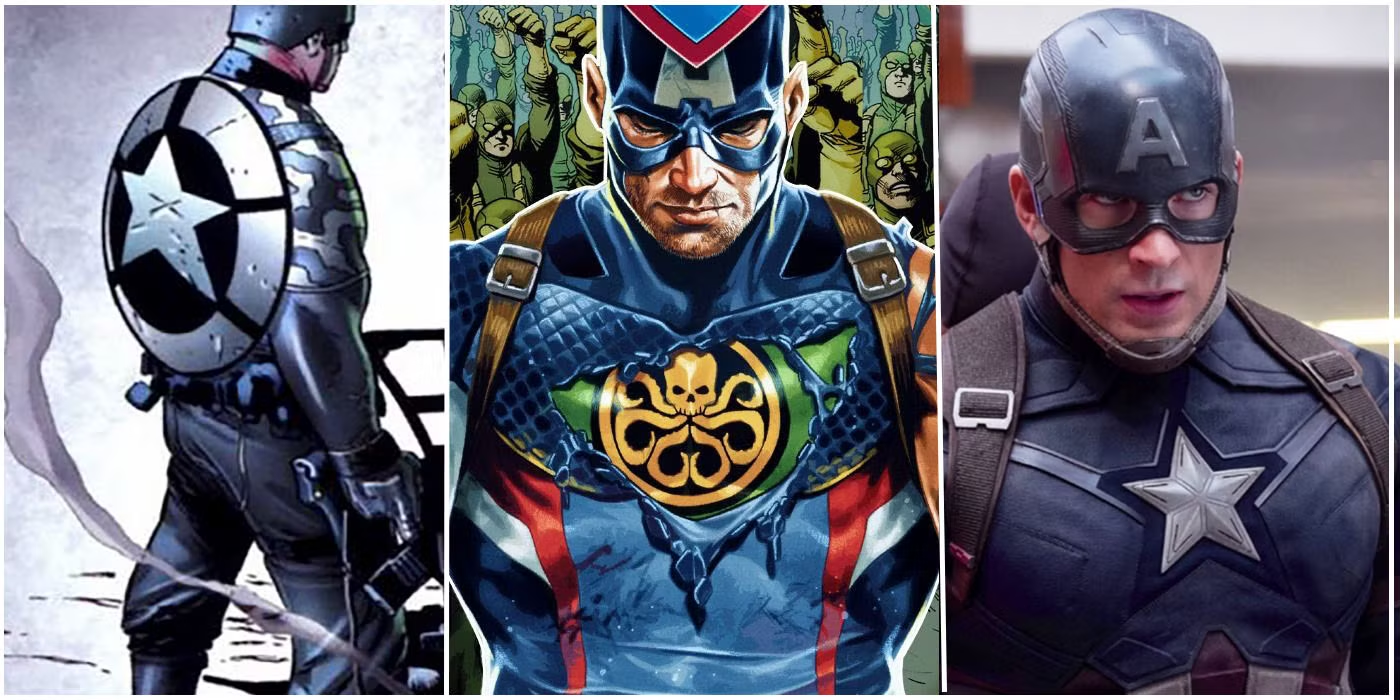Introduction
Captain America, the super-soldier with an unshakable moral compass, has long been a symbol of heroism in the Marvel Universe. Yet, in recent years, debates have surged: “Why is Captain America so bad?” Is it his old-fashioned ideals? His unwavering loyalty to duty? Or is there more beneath the shield? Let’s dissect the criticisms surrounding Captain America and explore why he evokes such strong reactions, particularly the question: “Why is Captain America so bad?”
1. “Outdated Idealism” – A Man Out of Time?
Critics argue that Captain America’s “boy scout” persona feels out of touch in today’s morally gray world. Unlike antiheroes like Deadpool or the Punisher, Steve Rogers’ refusal to compromise—even when faced with complex dilemmas—can come across as naive. His staunch belief in “truth, justice, and the American way” clashes with modern audiences who crave flawed, relatable protagonists. But is this a flaw or intentional storytelling?

The Counterpoint:
Cap’s rigidity is the point. He’s a man displaced by time, clinging to principles in a world that’s moved on. His struggles in Captain America: The Winter Soldier, where he confronts government corruption, highlight the relevance of his ideals. The question isn’t whether he’s “bad”—it’s whether society has drifted from the values he represents.
2. “Too Perfect” – The Mary Sue Allegation
Some fans claim Cap lacks depth because he’s too virtuous. Unlike Tony Stark’s ego or Thor’s hubris, Steve’s biggest flaw is… being too selfless. This “perfection” can make him seem less dynamic compared to peers.Why Is Captain America So Bad ?
The Counterpoint:
Steve’s humanity shines in quieter moments. His guilt over Bucky’s fate, his loneliness in Avengers: Endgame, and his willingness to defy authority (e.g., Civil War) reveal layers beneath the shield. His “perfection” isn’t laziness—it’s a narrative challenge to explore what true leadership costs.
3. “Political Symbolism” – A Shield That Divides
Captain America’s identity is tied to the American flag—a double-edged sword. While meant to embody hope, the character’s association with U.S. nationalism alienates global audiences and those critical of America’s history. The infamous Hydra-Cap storyline (2016) even weaponized this, revealing how fragile his symbolism can be.
The Counterpoint:
The best Cap stories confront this tension. The Falcon and the Winter Soldier tackled race and legacy head-on, questioning who the shield truly represents. Steve himself evolves, acknowledging America’s flaws while fighting to uphold its potential.
4. “Action vs. Depth” – Where’s the Super in Super-Soldier?
Let’s face it: Cap’s power set isn’t the flashiest. No high-tech suits or godly hammers—just strength, strategy, and a vibranium disc. Critics argue his battles lack the spectacle of Iron Man or Thor, making him seem “boring” in action-heavy team-ups.
The Counterpoint:
Cap’s brilliance lies in his tactical mind. The elevator fight in Winter Soldier or the Battle of New York in The Avengers showcase his ability to outthink opponents. His power is leadership, turning a ragtag team into a force.
5. “Legacy vs. Evolution” – Can Captain America Grow?
Steve Rogers’ retirement in Endgame sparked debates: Can anyone else wield the shield meaningfully? Sam Wilson’s takeover faced backlash, with some fans rejecting a Black Captain America. This resistance underscores a deeper issue: Can the mantle evolve without losing its essence?
The Counterpoint:
Sam’s journey in The Falcon and the Winter Soldier proves growth is possible. The mantle isn’t about the man—it’s about the ideals. If Cap feels “bad,” it’s because we’re wrestling with what those ideals mean today.
Conclusion: Is Captain America Really ‘Bad’—Or Just Misunderstood?
The backlash against Captain America often says more about us than him. In a cynical age, his unwavering integrity feels uncomfortable, even threatening. Yet, that’s why he matters: he’s a mirror reflecting who we are and who we aspire to be. Is he “bad”? No—but he’s a hero demanding we confront hard questions about morality, identity, and what we truly value.
Love him or loathe him, one thing’s clear: Captain America will always be a hero worth talking about.
Final Note:
This article isn’t about tearing down a legend—it’s about understanding why legends provoke debate. Whether you see Cap as a paragon or a paradox, his story is far from over.
Introduction
Captain America, the super-soldier with an unshakable moral compass, has long been a symbol of heroism in the Marvel Universe. Yet, in recent years, debates have surged: “Why is Captain America so bad?” Is it his old-fashioned ideals? His unwavering loyalty to duty? Or is there more beneath the shield? Let’s dissect the criticisms, explore the nuances of Steve Rogers’ legacy, and uncover why this hero sparks such polarizing reactions.
1. “Outdated Idealism” – A Man Out of Time?
Critics argue that Captain America’s “boy scout” persona feels out of touch in today’s morally gray world. Unlike antiheroes like Deadpool or the Punisher, Steve Rogers’ refusal to compromise—even when faced with complex dilemmas—can come across as naive. His staunch belief in “truth, justice, and the American way” clashes with modern audiences who crave flawed, relatable protagonists. But is this a flaw or intentional storytelling?
The Counterpoint:
Cap’s rigidity is the point. He’s a man displaced by time, clinging to principles in a world that’s moved on. His struggles in Captain America: The Winter Soldier, where he confronts government corruption, highlight the relevance of his ideals. The question isn’t whether he’s “bad”—it’s whether society has drifted from the values he represents.

2. “Too Perfect” – The Mary Sue Allegation
Some fans claim Cap lacks depth because he’s too virtuous. Unlike Tony Stark’s ego or Thor’s hubris, Steve’s biggest flaw is… being too selfless. This “perfection” can make him seem less dynamic compared to peers.
The Counterpoint:
Steve’s humanity shines in quieter moments. His guilt over Bucky’s fate, his loneliness in Avengers: Endgame, and his willingness to defy authority (e.g., Civil War) reveal layers beneath the shield. His “perfection” isn’t laziness—it’s a narrative challenge to explore what true leadership costs.
3. “Political Symbolism” – A Shield That Divides
Captain America’s identity is tied to the American flag—a double-edged sword. While meant to embody hope, the character’s association with U.S. nationalism alienates global audiences and those critical of America’s history. The infamous Hydra-Cap storyline (2016) even weaponized this, revealing how fragile his symbolism can be.
The Counterpoint:
The best Cap stories confront this tension. The Falcon and the Winter Soldier tackled race and legacy head-on, questioning who the shield truly represents. Steve himself evolves, acknowledging America’s flaws while fighting to uphold its potential.
4. “Action vs. Depth” – Where’s the Super in Super-Soldier?
Let’s face it: Cap’s power set isn’t the flashiest. No high-tech suits or godly hammers—just strength, strategy, and a vibranium disc. Critics argue his battles lack the spectacle of Iron Man or Thor, making him seem “boring” in action-heavy team-ups.

The Counterpoint:
Cap’s brilliance lies in his tactical mind. The elevator fight in Winter Soldier or the Battle of New York in The Avengers showcase his ability to outthink opponents. His power is leadership, turning a ragtag team into a force.
5. “Legacy vs. Evolution” – Can Captain America Grow?
Steve Rogers’ retirement in Endgame sparked debates: Can anyone else wield the shield meaningfully? Sam Wilson’s takeover faced backlash, with some fans rejecting a Black Captain America. This resistance underscores a deeper issue: Can the mantle evolve without losing its essence?
The Counterpoint:
Sam’s journey in The Falcon and the Winter Soldier proves growth is possible. The mantle isn’t about the man—it’s about the ideals. If Cap feels “bad,” it’s because we’re wrestling with what those ideals mean today.
Conclusion: Is Captain America Really ‘Bad’—Or Just Misunderstood?
The backlash against Captain America often says more about us than him. In a cynical age, his unwavering integrity feels uncomfortable, even threatening. Yet, that’s why he matters: he’s a mirror reflecting who we are and who we aspire to be. Is he “bad”? No—but he’s a hero demanding we confront hard questions about morality, identity, and what we truly value.
Love him or loathe him, one thing’s clear: Captain America will always be a hero worth talking about.
